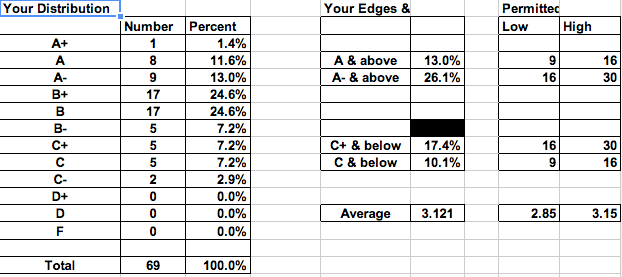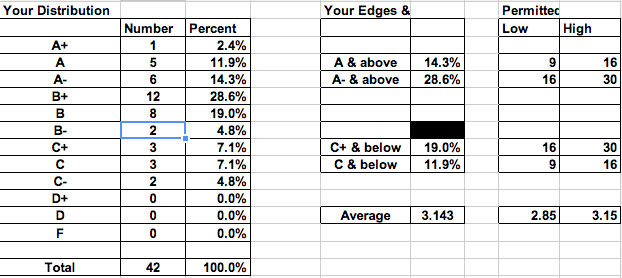Hi everyone! I have submitted grades for both sections. I am very proud of all of you. This was my first semester teaching Property, and I did not know what to expect with the exams. On the whole, you nailed it. I put together really difficult fact patterns that were quite open-ended, with the intent that there would be many, many, many correct answers. I thought I had considered all the possible answers, but several of you came up with things I didn’t even think of. Well done.
Additionally, many of you incorporated various concepts we talked about in class that were not in the textbook (such as the Coase Theorem, various constitutional concepts, etc.). This made me beam with pride.
Finally, despite all of your concerns, almost every single one of you managed to completely answer the question within the word limit. In other words, the differences between the A, B, and C was not due to an inability to write within the word limits. You also got very creative with abbreviations (APed was my favorite–adversely possessed) and really-long-hyphenates-to-avoid-adding-another-word.
The Exams
Section B
You can download the exam for Section B here: Property II Fall 2012 Section B Exam
I provide for your consideration the A+ exam here: SectionB-BestPaper
Section D
For this exam, I must confess error. In paragraph 5, I wrote:
Back in 1990, Carl and Domer, who were at the time the owners of Dryacre and Wetacre, respectively, reached a set of covenants.
It was clear that Carl owned Dryacre and Domer owned Wetacre.
Later in paragraph 7, I wrote
Second, Aggie discovered that when Domer acquired Dryacre from Edna in 1985, Edna inserted a covenant into the deed so that the land could only be used for “agricultural purposes.”
This was an error. It should have been “when Carl acquired Dryacre.”
To make up for that mistake, I gave everyone equal credit for that issue. It was one of many issues, and barely made a dent in the scoring.
Here is the corrected exam: PropertyIIExam-Blackman-SectionD-Correct
I also provide for your consideration the A+ paper: SectionD-BestPaper
The Grades
First year classes, including Property II, are subject to the school’s mandatory grading curve (see p. 84 of the handbook):
grades assigned in classes of 40 or more students shall conform to a mandatory grading distribution. That distribution provides for a required 9-16 percent for A+/A, a required 16-30 percent for A+/A/A-; a required 16-30 percent for C+/C/C-/D+/D/F; and a required 9-16 percent for C/C-/D+/D/F. The class average shall be 2.85-3.15.
I think you will find that in each section, the scores approached the upper limits of the grades allowed above an A-, and approached the lower limits of grades below C+. In addition, the class average was very close to the upper limit (3.15). In other words, there were more As than Cs, and the class averages were quite high.
Here are the full breakdowns for each section.
Section B
- Average: 3.121
- A and above -13.0%
- A- and above – 26.1%
- C+ and below: 17.4%
- C and below: 10.1%
Section D
- Average: 3.143
- A and above – 14.3%
- A- and above – 28.6%
- C+ and below: 19.0%
- C and below: 11.9%
Thank you all for a great semester! BTW, if you wrote either of the A+ papers, please email me, if you’d like. Thanks!

